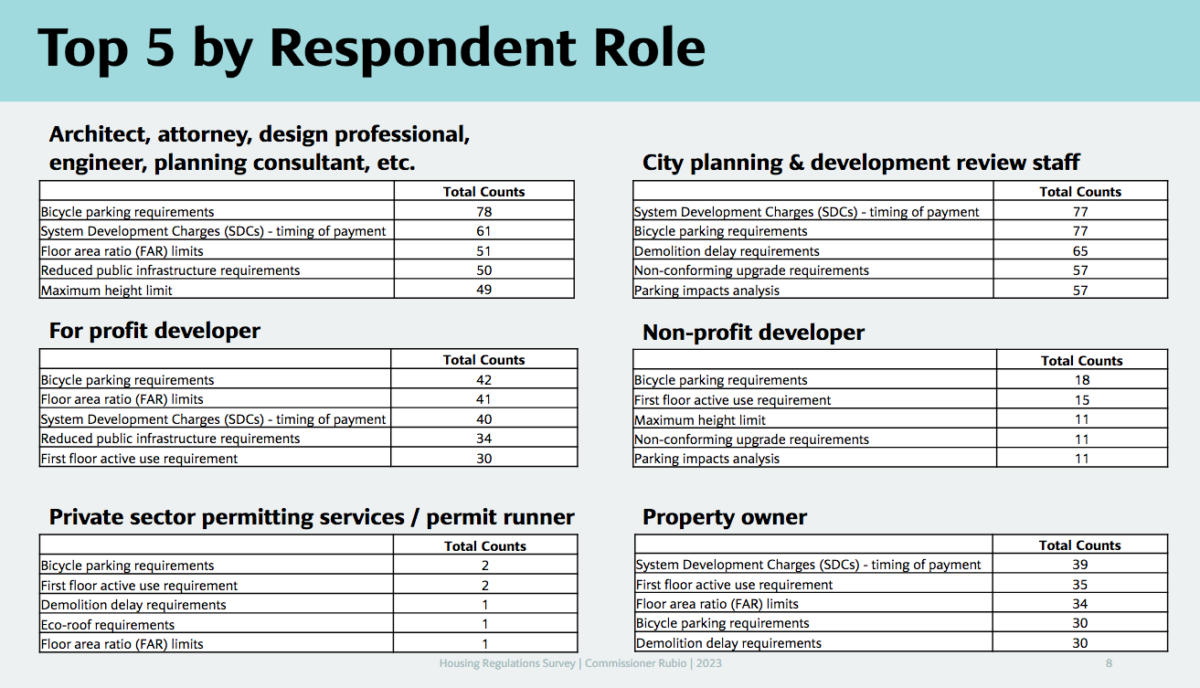
Requirements for bicycle parking in new residential buildings have begun their roll back.
On Tuesday night, the Portland Planning Commission recommended suspending, or striking altogether, several bike parking requirements which were adopted by City Council in 2019, including:
- A temporary reduction of long-term parking-to-unit ratios
- A permanent deletion of in-unit parking standards, such as the 15-foot and alcove requirements
- A temporary removal of the cargo bike accommodation requirement
- Adjustments to required loading spaces
Essentially, the Planning Commission will recommend the Housing Regulatory Relief Project (HRRP) bike parking amendments as written to the Portland City Council.
The Commission passed the entire HRRP package by a 7-1 vote, and considered their own four amendments on bird-safe glazing, eco-roofs and neighborhood contact requirements — along with a group of “technical amendments,” which amounted to clarifications and word-changes. Some changes are permanent and others are meant to be temporary and will sunset in five years.
“I’d like to call attention to the bike parking piece as a specific follow-up… I’d like to ask city council to commit to looking at that section of the code—without waiting five years.”
– Eli Spevak, planning commissioner
No amendments to HRRP’s bike parking modifications were proposed, either by staff or the commissioners. The commission spent the bulk of the time discussing their bird-safe glazing and eco-roof amendments to the draft proposal. In a win for the Audubon Society, the commission decided to retain the existing bird-safe code and noted that it was a complicated issue that “needs a little bit more time.”
Readers might recall that the HRRP began this year with a survey sent by the Bureau of Development Services (BDS) and Commissioner Carmen Rubio’s office to people who had recently interacted with BDS, including city staff. The survey asked “What are the top five requirements the City of Portland should consider suspending or modifying to support increased housing production?”
Of the 22 options listed, respondents reported bike parking to be the most onerous of the requirements.
Yesterday’s hearing was the third hearing in nearly as many weeks about the package of code changes aimed at boosting housing production. After the outpouring of public testimony at the initial hearing on October 24th, the Planning Commission called for a work session on November 7th. Tuesday’s vote was to consider resulting Planning Commission amendments to the HRR draft plan.
Commissioners wrestled with the intricacies of several complex policies in a compressed timeframe. Votes on a few amendments were evenly split. The eco-roof amendment only passed after Commissioner Eli Spevak called for second vote on it, right before the final vote on the entire HRR package. The group could not come to an agreement on bird-safe glazing.
After the final vote to recommend the amended HRR package to City Council, Chair Mary-Rain O’Meara commented that “there will be a lot of happy developers and people trying to advance housing.”
Here are the three changes to existing bike parking code that were supported by Planning Commission (taken from HRR proposed draft):
The first temporarily reduces the long-term bike parking ratios for household living uses for a period for 5 years. Within the inner pattern areas (see graphic at right), the ratio is reduced from 1.5 to 1 space per unit. In the outer pattern areas, the ratio is reduced from 1.0 to 0.7 space per unit… Over the next 5 years, staff can study whether the existing ratios balance future needs with space utilization of housing projects to potentially consider a future amendment.
The second and third amendments simplify the in-unit bike parking standards (up to 50% of the required bike parking spaces are allowed in dwelling units) and temporarily removes the requirement for larger bicycle parking areas to accommodate larger or cargo bikes.
When discussion turned to what the accompanying letter to Council should say, the commissioners appeared to relax. The discussion of the letter was telling. A couple commissioners wanted to preserve the debate and discussion of their various amendments, either in a spreadsheet-type format, or a synopsis of the debate, to pass on to the City Council. They wanted to document that votes were split on several issues, and that “we did consider these items very seriously.”
Several commissioners also brought up monitoring and review of the code changes, “how will we know at the end of five years that, either these measures are successful, and how significantly they alleviated burdens to housing development, or maybe the opposite of that, the unintended consequences.”
As the discussion unfolded, commissioners made it clear they understood the magnitude of what they had just voted for, namely to undo the decisions of previous Planning Commissions and City Councils, some of it recent (like bike parking and eco-roofs) and other code (such as neighborhood notification) which has been baked into city governance for decades.
Finally, Commissioner Spevak brought up bike parking, “I’d like to call attention to the bike parking piece as a specific follow-up piece. We concluded with 100% of staff recommendation on this, because we recognized this is just going to take more time than we have here. So, I’d like to ask city council to commit to looking at that section of the code—without waiting five years. Sooner.”
The Planning Commission will forward their recommendation to the Portland City Council for consideration and a vote in December.
— A video of the meeting can be seen on YouTube.




